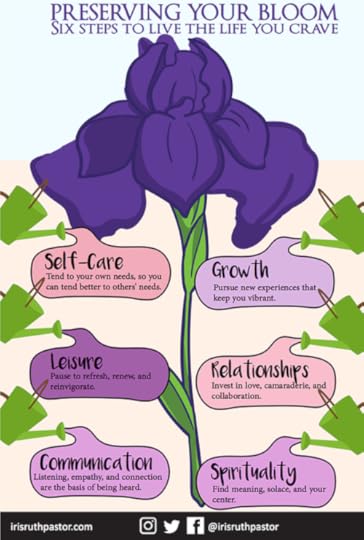Iris Ruth Pastor's Blog, page 39
November 29, 2017
Surviving Thanksgiving With Your Relatives
Most of the time we can avoid those people in our families who stress us out and unhinge our most aggressive tendencies. Thanksgiving is the exception.
As the late Johnny Carson said, “Thanksgiving is an emotional holiday. People travel thousands of miles to be with people they only see once a year. And then discover that once a year is way too often.”
All over the country, parents, siblings, aunts, uncles, cousins, in-laws and out-laws will be gathering to traditionally give thanks around a table over flowing with both rich foods and alcohol-laced drinks, commemorating the holiday of Thanksgiving. Especially nowadays, with how triggered people feel by politics.
It’s no wonder stress levels in general are at an all time high. So, how gracious, dignified and enjoyable will that dinner table atmosphere at Thanksgiving be? How can we possibly make it through dinner without incessant under-the-table knee pinching? Outright name calling? Hot heads on both sides abruptly leaving the table before the turkey has even been carved?
Before the big event if you are NOT hosting, to avoid the “wired and tired” state of mind:
Get a massage, mani or pedi or all three
Bone up on your anger management and conflict resolution skills.
Role play ahead of time how to diffuse Uncle Fred’s inappropriate rhetoric.
Do tons of deep breathing and stretching exercises the morning of
Meditate right before leaving the house.
Promise yourself that if you get through Thanksgiving with your grace and dignity intact that the day after you will do something shockingly decadent, delicious and utterly self-indulgent.
Before the big event if you ARE hosting, to avoid the “wired and tired” state of mind:
Shower yourself with pampering the week before.
Don’t freak about the cleanliness quotient of your house. Honestly, no guest cares if your blinds are dusty and your windows aren’t sparkling clean. Focus on the meal.
Delegate, delegate, delegate.
Potluck it: ask each person to bring their signature dish.
Outsource the tough parts – like roasting an oversized turkey in your apartment’s pint size oven.
Consider professional catering.
To keep the more high-spirited, fiery guests separated, utilize place cards.
Recruit tons of clean-up help.
Never do it again.
Double the self-indulgent bonus on Friday. You earned it.
At the event:
Ban all political banter. (Tee Hee.)
Drink to excess and with every swallow repeat the following chant: I’m thankful. I’m grateful. I’m blessed.
Wear stretch pants since it’s the day of no-diets. You can gobble til you wobble. Eat pie. Drink wine. Or eat wine and drink pie. Whatever.
Overload on carbs and sugar, rendering yourself useless to even follow a semi-rational discourse on any subject. After all, the average American eats around 4500 calories on Thanksgiving – equivalent to 14 slices of pumpkin pie – it’s almost like gluttony is our patriotic duty on this day.
Tirelessly switch the topic back to sports and fashion. (In my family, that may actually work.)
Inject some humor by telling wildly inappropriate jokes – at least keeping the kids enthralled.
On a more sober note:
Ask the kids to finish one of these two sentences:
Today is great because…
My favorite thing about Thanksgiving is..
Rev up your Gratitude Meter:
Messages abound this holiday season about the importance of mindfully employing gratitude. About choosing to be grateful. It’s simple: gratitude helps us see what is there in our lives rather than what is missing. It’s being grateful for everything: the highs and lows. The gains and losses. Disappointments and celebrations. Setbacks, come backs and the do- overs. Opportunities missed and risks taken.
Let’s face it: it’s not whether you view your cup as half-full or half-empty. It’s being thankful you even have a cup. The practice of gratitude simply turns what we have into enough. So on this day, let’s not look back at what we had nor ahead to what we hope to have. Let’s just enjoy what’s right in front of us.
Thanksgiving is a simple time for thanks and giving. Brene Brown says people are innately wired to be heard, acknowledged and valued. This is the time to do all three. And thank the host and hostess heartily.
HAPPY TURKEY DAY!
Keep Preserving Your Bloom,
Iris
November 13, 2017
The Preserving Your Bloom Manifesto
Today I want to share a little gift with you, something very personal to me. Thirty years ago, I began putting pen to paper and now fingers to keyboard. I began writing my slice-of-life column, “Incidentally, Iris” and in that time, have shared more than seven hundred columns.
In them I touched on accidents, guilt, ill health, lousy behavior, lousy meals, lousy days. Goals attained and those that fell short. Losses avoided and losses sustained. Honors. Awards. Hard won wisdom. Ruptured relationships. Celebratory milestones.
I wrote about the pain of losing my grandmother to pancreatic cancer at the beginning of first grade. Readers experiencing that same kind of premature loss spoke up.
I wrote about the frustration of my kids always remembering the things I didn’t do and forgetting the many things I actually DID do. And parents who were struggling with their own childrearing issues spoke up.
I wrote about five pounds lost and seven re-gained. About the joys and gulit of retail therapy when having a bad hair day – or any kind of bad day. Of keeping Saturday nights with my husband sacred – a time for just him and me – even though the kids were cranky, the bills piling up and the Formica kitchen counters were sticky with yesterday’s jelly.
In doctor’s waiting rooms, in the bleachers at Little League baseball games and in grocery store lines, strangers approached me – remarking on my ability to mirror their thoughts, fears, goals and aspirations. To be in their kitchens with them, so to speak.
All that time, I thought I was writing columns just about me. It took me a long time to realize I was writing about you too.
Now I want to share something special with you: a visual guide to the fundamental elements you’ve consistently read about.Think of it as a mission statement – a personal manifesto. It’s a document you can return to again and again. This:
The manifesto is my personal gift to you – designed to keep you (and me) balanced and focused and energized as we move through life. It’s how to live what you believe in.
Please feel free to download it by clicking the image or here. Print it out (hey, splurge and click the color key). Post in a conspicuous place. Refer to it often.
When you are pulled in too many directions too much of the time.
When you overestimate your powers of concentration, organization, and energy.
When you profess to embrace the concept of self-care but never seem to make it to the gym.
Or profess to value the connection and camaraderie of a deep friendship, but never manage to spend any quality time with your buddy.
Remind yourself that not only do you matter, but you have an obligation to use your talents and resources to be the happiest, the wisest and the best you can be. Think of the sweeping changes that would occur if each of us were operating at top capacity. Think of the sweeping changes that would occur if we took better care of ourselves, so we could then take better care of our families, friends, communities and world.
Let’s begin.
Keep Preserving Your Bloom,
Iris
October 27, 2017
My Halloween message: Who says the dead can’t speak?
When you have young kids, you plan their birthday parties, organize grill-outs with neighbors, throw baby showers and surprise thirtieth birthday parties for your best friends and ten year anniversary parties for your favorite couples.
And the streamers fly and the laughter rings out and the time goes by. And then the children grow up and move on. And things begin to change. The house gets quiet and the tumult simmers down. There is more behind you than ahead.
I realized this one day when I came home from attending the third funeral in less than a month. Fresh in my mind was the grief, the logistics of death, and the details guiding the process. Surely there was room for some originality and humor.
“Okay,” I said to my husband, in a matter of fact tone, “It’s time to start a funeral file of personal preferences.”
“You’re morbid,” he accused me.
“No, I’m not, “I retorted hotly, “I’m pragmatic. And what better time to start a file on scary subjects than Halloween?”
Apparently, I’m not alone in my thinking. Tombstones and memorials are reflecting a decided shift in emphasis to the personal. David Quiring, a monument maker in Seattle says, “People resist being just another brick in the wall. They really want to preserve their uniqueness.”
People who want to be memorialized with pizzazz and verve are picking their own tombstone inscriptions. Example: Here lies Pearl. A helluva girl.
And they are picking their own tombstone design. Examples: Cut-out electrical guitars, teddy bears, and favorite flowers.
One couple commissioned a life-size sculpture of a Mercedes Benz. The thirty-six ton work cost more than $250,000 and took two years to make. A family commissioned a tablet in the image of a $100 bill and had the dead man’s name inscribed where Ben Franklin’s picture should be.
Actually, the business of making highly personalized gravestones has been around for decades and decades – providing a lasting testimonial of a life uniquely lived. And doing a few other things besides.
Like a little marketing:
Here lies Jane Smith
Wife of Thomas Smith
Marble cutter:
This monument erected by her husband
as a tribute
to her memory
Monuments of this style
are 250 dollars
And matchmaking:
Sacred to the memory
of Jared Bates
His widow, age 24,
lives at 7 Elm Street
has every qualification
for a good wife
and yearns
to be comforted
And joke making:
Here lies a father of 29
there would have been more
but he didn’t have time
And name calling:
On a miser:
poorly lived
and poorly died
poorly buried
and no one cried.
And revenge seeking:
Dear Sister,
here lies the body
of Mary Ford
we hope her soul
is with the Lord
but if for hell
she’s changed this life
better live there
than as J. Ford’s wife
If tombstones are what descendants see forever, eulogies are what friends, family and loved ones hear as your last statement of values, attitude, philosophy of life, and personal and professional experiences. Of Milestones reached. And goals attained.
You can have a loved one or close friend deal with the obvious details one usually puts in a eulogy: brief chronological outline of key life events such as graduating from college, getting married, having children and grandchildren, starting a business, honors accrued, milestones reached and goals attained. And of course a few favorite memories of you and the speaker. Experts in funeral planning suggest 98% of the eulogy should be about the life of the deceased and 2% on death and end of life details. Makes sense. Obviously that can’t be something you write about – you’ll already have passed on!!!!!
But, think about this, many of us are in the autumn of our lives and we are growing more reflective as each season passes. And more conscious of the legacy we will be leaving our loved ones. How best to guarantee our voice gets heard? You got it. LET US COMPOSE OUR OWN EULOGY. PRE-ARRANGE FOR SOMEONE TO READ IT AT OUR FUNERAL, ALONG WITH THE MORE TRADITIONAL TRIBUTE OR IN PLACE OF IT.
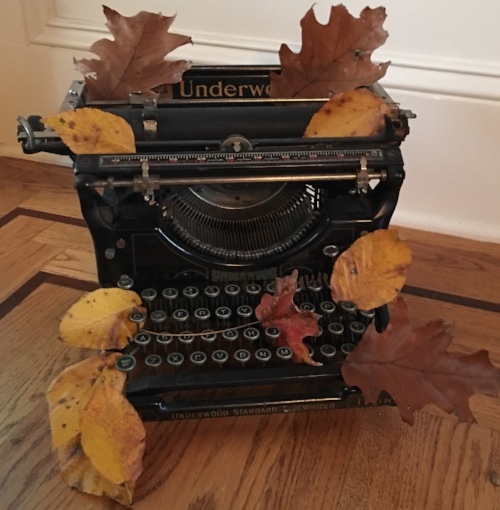
Haul out the old typewrite and begin to write your eulogy. What do you include? Okay, maybe it’s not the time to unleash your inner weirdness or go off on a self-tooting, totally immodest tribute, but humor, pathos, and tales of struggle and triumph are entirely permissible (at least by me!).
So include:
a lesson learned
something you were passionate about
an accomplishment you want to be remembered by
an experience that defined you
a philosophy you adhered to
a person you greatly admired and why
a piece of advice for the younger generation
I first thought about writing my own eulogy when my social media guy convinced me to hire a professional to write my bio. It had all the “necessary” information, but none of what made Iris “Iris.”
You can’t control how and when you die but you can control how you will be remembered. Don’t leave it to someone else to copy, paste and delete.
It’s your last chance to say what you want to say to a room full of people gathered together to bid you farewell, mourn your passing and celebrate your life.
I’m seriously considering gathering a group of my friends together – plying them with an endless supply of Merlot – and encouraging them to take a stab at penning their own eulogy. In fact, I’m putting it on my ever-growing bucket list. Right after I master the art of staying balanced on my damn bike so I don’t become our county’s latest bicycle fatality.
Until then, Happy Halloween, Keep Preserving Your Bloom and please send me a sample of what you banged out on the old Underwood.
Iris
October 16, 2017
Are You Lucky?
My father was actually a member of the “Lucky Bastard Club” for surviving as a crew member of a B-17 bomber in World War 2. This is him:

Which makes me the daughter of a “Lucky Bastard.”
Which makes me a “Lucky Bastard” too.
Not because I survived bombing missions over Germany.
Nope.
I’m a “Lucky Bastard” because all my life I’ve had friends to love me, support me, lift me up and celebrate with me.
A bond with my very first best friend took root when I could still go bare-chested without social exile. And, believe me, that did not last long! Jeanie was a whirlwind of curiosity and chutzpah. And I blindly followed her everywhere, as evidenced by our positions in her wagon. She is in the front and I am in the rear.
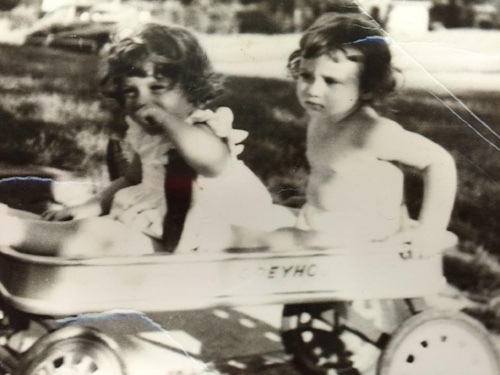
The complexities of ties that make up a special non-familial relationship change as we mature and are based less on superficial preferences and more on an individual’s internal depth and range. But even back then, I did seek out those who were intrepid and opinionated as my buddies. And I still do.
What is the “Lucky Bastard’s”secret?
Simple: Knowing how to make the bad times good and the good times unforgettable.
And that’s what friends do.
What’s the “Lucky Bastard”tribute?
A sing-song poem to my wonderful friends in Cincinnati who threw me a 70thbirthday party.
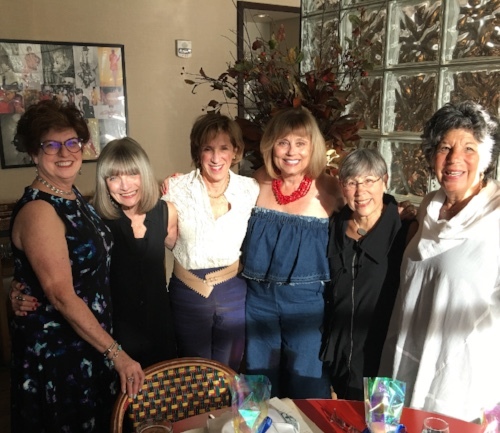
And a sing-song poem to my wonderful friends in Tampa who threw me a 70thbirthday party.
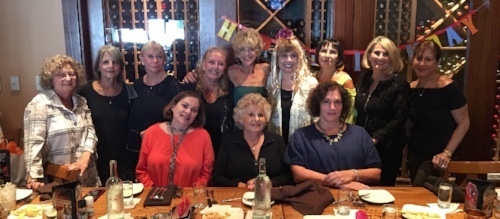
And to all my other close friends, literally sprinkled in cities throughout our great country.
I know, I know
I’m a crappy friend
From the very beginning
And probably to the very end
I only like to text
And hate the phone
End up spending
Much time alone
So forgive my cocooning
My foibles and lacks
But remember as a friend
I’ve always got your backs
But not in the morning
When writing time does beckon
But at any other time
I’m a force to be reckoned
We’ve cried and bitched
And laughed and derided
Followed each other’s tips
So we were not blindsided
We’ve parsed through our problems
And laughed at our own craziness
And took advice sometime
And other times indulged in laziness
We listened even when we made no sense
When times were good or life was tense
When venting was the only solution
To something with no easy resolution
So thank you for coming
To my 70th party
For eating and drinking
Not in moderation, but quite hearty
You each are so vibrant
In your own unique way
And I’m pleased we are able to share
This very special day
What makes a “Lucky Bastard’s”friends so valued?
They are:
Intellectually curious
Trailblazers in many fields
Adaptable
Persevering
Pragmatic
Generous
Fearless
Resilient
Talented
Loyal
Warrior-princess like
Possessing a razor-sharp wit
and a no-bullshit attitude
In short, they are all “bad asses”
Why are you a “Lucky Bastard” when it comes to friends?
Please click “reply” and tell me how your best friends brighten your world and inspire you to power through life’s challenges with gusto and strength.
And Keep Preserving Your Bloom,
Iris
October 9, 2017
At 70, Am I Too Old To Do Cartwheels?
When I was about three years old, my mom enrolled me in dance class. At ballet, I was graceless. At tap, I was rhythm challenged. But at acrobatics, I excelled. It wasn’t long until I was doing handstands, somersaults, back bends and cartwheels all over the place.
By age eight, I had a routine down pat. One hundred cartwheels a day – no matter what. In winter, I did them next to the washer and dryer in our dank, dark basement. (I was banned from the living room after crashing into the cocktail table and breaking a lamp.) In spring, summer and fall, I cartwheeled up and down our blacktop driveway.
Though I try, I can’t remember when I stopped doing my 100 cartwheels a day. Somewhere around the time I discovered boys, make-up and the telephone, I suppose. But even with the passing of years, I continued to counter my self-dramatizing mood swings with a modified routine of cartwheel capering at sporadic intervals.
Shortly after each one of my sons mastered walking without tottering, I would demonstrate my cartwheel prowess. They were not the least bit enthralled. But my bowling team thought it was a pretty cool move for someone in their 30’s. And so did the elementary school board moms when, at the close of our monthly meeting, I hopped up and shot off a few at the age of forty-two. I fantasized that they too clambered to shed their yuppie shackles and follow me down the yellow brick road – all the while doing cartwheels too. Who knows maybe we could have had a “cartwheelathon” and raised money for a worthy cause if I had pushed my agenda a tad harder?
I turn fifty-four – the age when time meets reality – and it’s been a long time since I’ve done a cartwheel.
Can I still do it?
The thought makes me heady – like working without a net. As singer-songwriter Alanis Morissette says, “If I’m scared of something, that’s a pretty good indication that I should do it – except for heroin and sky-diving.”
One morning after finishing my exercise routine by walking around the track, with little forethought, I fling my body forward, lean in, lift off – and to my utter amazement – execute a cartwheel. I automatically take another few steps, gain momentum, and do one more.
I am ecstatic. Tomorrow I will increase the number. And the next day after that, do even more. Soon I will be up to my old faithful 100 – beguiling myself with the passionate adage that “more is better and most is best.” No cool restraint for me.
I pay for my spontaneity the following morning. The bursitis in my hip acts up and my persistent shoulder problems show definite signs of re-emerging. I recognize the close alliance between boundless enthusiasm and self-destruction.
Cartwheel anxiety sets in. What separates challenge from foolishness? What idiot tests their body in such a ridiculous way at age fifty-four? Isn’t there enough misery in the world? Why add to my own personal domain?
Cartwheel anxiety has debilitated my vision. I know there are plenty of things in this world to get stressed about and my inability to do 100 cartwheels in a row without inducing physical impairment shouldn’t be one of them. But the icky feeling of no longer having that option as a viable goal at age fifty-four hovers over me. I wince as the bridge between make-believe and possibility dissolves. There will be no legend-building here.
Meanwhile, I read that while in Barbados, Luciano Pavarotti does water aerobics to fight the flab. His publisher says his girlfriend, Nicoletta Mantovani, would like him to be fitter, but he doesn’t imagine Luciano will ever be doing cartwheels down the street.
I feel slightly mollified. Not so terrible to be in the same category as Pavarotti.
And now I’m seventy.
I watch my granddaughters fling their springy little bodies down the halls of their houses – doing cartwheel after cartwheel after cartwheel – in a dizzying display of motion.
What have I learned?
I have learned to stand quietly by.
I have learned not even to attempt to try one cartwheel.
I have learned to remind myself of the things I can still do:
Easily touch my toes from a standing position
And, after a few warm-ups, touch my chin to my knee when my legs are spread eagle on the floor.
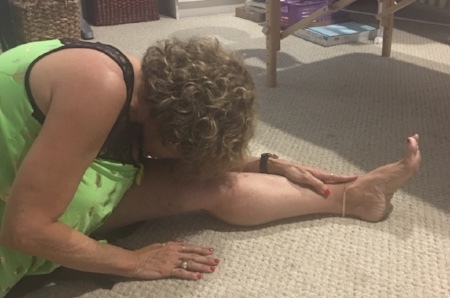
And what else have I learned?
To be okay with my limitations.
What physical feat have you given up?
What physical feat are you still in the throes of perfecting/doing?
And how do you feel about those insidious age-creeping limitations?
For now, I’m going to be satisfied with stretching!
Keep Preserving Your Bloom,
Iris
September 18, 2017
Four Lessons from Irma
Iris, I live in Tampa, Florida two blocks from Tampa Bay in a house surrounded by century old oak trees.
On Friday night, September 8, things were looking very ominous for Tampa. Hurricane Irma was fast approaching with a vengeance — the one hundred year perfect storm. The Hillsborough River, which empties into the bay two blocks from our house, had so much water flow out toward the bay that it was now ten feet lower than normal.
Most frightening of all: this was being reported on by Anderson Cooper, the “A Team” of CNN, stationed on the river walk fronting the river. That was most terrifying confirmation of all: the Tampa Bay Area was set for major and catastrophic devastation in the next two to three days from Hurricane Irma.
Already there was no bottled water left on the shelves. No available plywood to board up windows. No automatic phone chargers. No flashlights or batteries for radios. Gas was in short supply. I had been getting calls all day from my sons telling me to “get out of Dodge.”
My husband, our son Sam and I had worked all day dragging my vast array of potted plants and porch furniture indoors. Having anything outside that could go airborne was foolish and careless. I had stashed my dad’s World War II uniforms and dog tags in the washing machine to protect them, and put the the kids’ baby books and picture albums in the dryer. Thinking about taking anything else of value was too overwhelming.
The mass evacuations from South Florida were beginning to clog the highways, and gas stations along I-75 were closed due to lack of fuel. We made a quick decision to leave rather than wait for daybreak. At 1:30 am, with one small packed suitcase between my husband and I and a light weight duffel for Sam, we loaded up the car, hustled our dog, Lola the Lab, into the already cramped back seat and set out. Loaded with non-perishables to nibble on, $500 in cash, and a full tank of gas, we headed to I-75 in the shrouded cover of darkness.
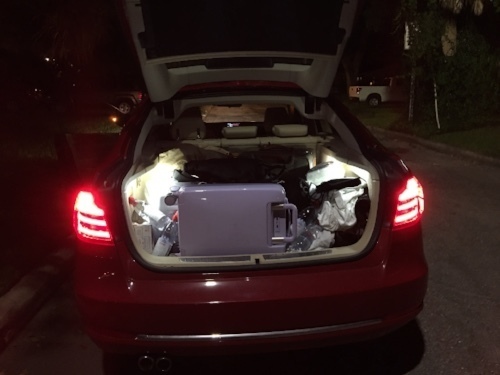
I looked back just once at my house as we pulled away — with a sinking feeling of dread that perhaps I’d never see it intact again.
The highway traffic at 2am was bumper to bumper. The gas gauge seemed to go down rapidly. Armed with a thermos full of coffee that I drank at a rapid clip to assure wide-eyed wakefulness, I soon had a full bladder. All along I-75, the gas stations were dark. Close to Gainesville — about 150 miles from Tampa — I began to experience the angst of the refugee. My bladder was bursting and the next public rest area was miles away. With trepidation, we pulled off the highway onto a litter filled desolate stretch of land sporting an abandoned gas station. A sense of the surreal enveloped me. I should be soundly sleeping in my king size bed with my Egyptian cotton sheets, not squatting in the dirt urinating, with the wind whipping around my ankles and no rolls of toilet paper nearby.
We arrived in Atlanta mid-morning without running out of gas or being stuck in clogged traffic jams. By 2pm, we were able to check into a brand new Residents Inn that had opened only four days before. We slept and when we woke, we remained glued to the TV monitoring Irma’s haphazard path.
Sometime during that long day, I did make a pit stop at a Barnes and Noble just steps from our hotel. I bought three books on resilience after a natural disaster. An immediate glow of warmth spread through me. “See,” I said to myself, “even if I lost everything, I have already taken positive steps to rebuilding my library.”
That didn’t prevent a sense of dread and foreboding enveloping me as the long afternoon crept by. my anxiety continued to increase exponentially. High winds. Predicted powerful storm surges. Flooded roads. Power outages that could last for days, if not weeks. Clearly Hurricane Irma was heading straight for Tampa.
And most worrisome? My oldest son had stayed behind to ride the storm out. Being a public official, he was committed to being both present and available.
None of us slept Sunday night. Weather alert updates continued to confirm Hurricane Irma’s capricious flailing around the entire Tampa Bay Area. High tide at 5:30am did not bring the expected storm surge of three to eight feet. Our overhanging oak tree limbs had stayed attached to their tree trunks due to the non-appearance of predicted cyclonic winds and our electric porch lights continued to burn brightly as the sun rose over the bay. My son had survived, barricaded in his own home nearby and he reported no discernible damage to the exterior or interior of our house. Clearly, Tampa had not only dodged a bullet, as one pundit remarked wryly, but a cannon. Others had not been so lucky.
So what did I learn from Irma?
Buy suitcases with the capacity to store a charge — which thanks to a present last year from my sons we did have. Of course, we had never used that benefit nor did we know how — but we quickly learned and plugged those suckers in and charged them up as back-up for our cell phones as soon as hurricane forecasts began appearing on the news.
Don’t throw out all your old battery operated radios. Keep one handy with the right size batteries. Don’t guess.
Appliances are great places to store things you want to save, even microwaves. Just remember to empty them before using!
You can follow all the projections and forecasts, but in the end, Mother Nature, like a typical woman, has her own mind and agenda — sometimes defying all predictions and logic.
I hope you and your loved ones have been safe these past couple of weeks through all of the storms. I’d like to hear how you have learned to prepare for the worst, while living for the best?
September 11, 2017
Filling the Void When You are No Longer the Hub
I remember very vividly the day this family picture was taken:
[image error]
Lou was gassy and cranky and wiggling like crazy on my lap. Harry (top left) was annoyed at being interrupted from watching The Jeffersons. Frank (top middle) was irritated at missing baseball practice. Max (bottom left) had to cut short a play date with his buddy Brad and Sam (middle bottom) missed his much-needed nap. And all, including my husband (top right) balked at the formal attire thrust at them and ordered to be put on – quickly and without complaint – by me. Except for Louie, who was too young to formally protest.
In spite of grumblings and mumblings, the photographer cajoled the whole gang into smiling and snapped the picture, capturing our family in a moment in time. That portrait would hang in every entrance foyer wall of every home we would live in after that.
Okay, I admit it. I get a lump in my throat and a pit in my tummy most afternoons when three o’clock rolls around and the school buses start dumping out kids on corners all over my neighborhood.
I see those kids. Tired. Hungry. Stooped over with a cumbersome back pack. Pushing their friends. Laughingly engaged in conversation. Or walking by themselves, anxious to reach home from a rough day of addition and subtraction.
I once had five little guys racing home – in a wide range of moods and with a great variety of tales to tell me. Or withhold from me. I once had masses of potato chip crumbs, rumpled couch pillows stained with spills from apple juice, missing homework crises and jumbled piles of mismatched soccer cleats to deal with. And car pool arrangements, teacher conferences, exam dates and basketball practice and game schedules to coordinate.
I am no longer the hub of my sons’ lives.
I realized this when Lou sent me this picture, just weeks after his first son was born at the beginning of the summer.
[image error]
I realized this when, in mid-August, Frank sent me this picture with him vacationing with his kids and wife on the West Coast.
[image error]
My sons’priorities have shifted.
My control has waned.
My power diminished.
No longer do I have a say in the day to day doings of my children – what sports they play, what time they go to bed, how much ice cream they sneak in before dinner, or if they write a timely thank you note or fail to write one at all.
So, if you are one of those parents whose back seats are empty, what can you do to fill the void? Here are five tips:
#1 Find a passion: And carve out uninterrupted time to devote to that passion. Be protective of that time. Do not apologize. I have a friend who takes classes each semester in the Ollie program at her local university – Osher Lifelong Learning Institute. She takes a wide variety of courses: Shakespeare, Classical Music, and Great Art, Architecture and Museums of the world. And very little gets in the way of her attending.
#2 Realize life is always a balancing act: It is impossible to always have your life in balance on a day- to-day basis. One of my friends, who has a challenging day job, is overwhelmed right now with caring for a mother who has multiple life-threatening health issues. Is she going to yoga class? Nope. Is she going out to a leisurely dinner with friends? Nope. Is she hosting sleepovers for her grandkids? Not at this juncture.
#3 Know your priorities: I have three: family, self-care and writing/speaking. Depending on circumstances and responsibilities, the order gets switched around and sometimes much more time is devoted to one than the other. But the important thing is that overall I am controlling my own remote.
#4 Invest or re-invest in personal relationships: I am now in regular contact with two buddies from college I haven’t spoken to in years. Ditto for some of my high school crowd. Take advantage of technology to re-connect with those you have lost touch with and to connect more frequently with the ones who you are close to. My sister and I talk more than ever. My husband and I are rediscovering the joys of spontaneous afternoon outings. We just went to a street fair and stocked up on whimsical gifts for our grand kids and bought a box of Greek pastries – just for us.
#5 Fan the flames of your curiosity: Ask questions. Stay eager to get out of your box. Explore your community’s needs. Develop ways to help others. I have a friend whose husband and buddies created and initiated a school safety program now in eighteen of their city’s public schools – and has expanded into helping adults read and mentoring and tutoring disadvantaged youth. Another friend volunteers weekly at a children’s grief center which provides free of charge help and support for children who have lost close family members.
I am so very happy my sons have grown into caring, involved and loving dads. But I miss those caring, involved and loving little boys too. Just yesterday, however, I was assured by one of my sons that although I was no longer the hub, I was still a very important spoke. I hope he speaks for all of them.
Keep Preserving Your Bloom,
Iris
August 31, 2017
I hadn’t ridden a bike in fifty-five years…
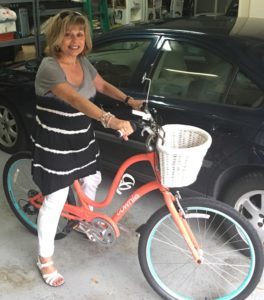 THE BUY
THE BUY
Riding a bike. “No big deal, right?”
After all, how much more was there to learn after giving up training wheels at the tender age of six?
“No big deal, right?” I surmised, when curled up on the couch one stormy night, eagerly searching the Internet for bikes appropriate for those of us with creaky joints and jiggly kneecaps.
I ventured into my neighborhood bike store, which sported a dazzling array of two-wheeled wonders. I debated between bikes with just foot brakes – the only kind I had ever ridden – or leaping into the unknown world of bikes with hand brakes, which I’d never used. Pause for some thought, but “no big deal.”
And the whole gear issue? Whatever. I went with the recommendation from the nice bike guy, Paul, and settled for seven gears. “Tee hee,” I grandly announced. “One for each day.”
My husband gave me his squinty eyed gaze (which always signified profound disbelief), pulled me aside and furiously whispered in my ear, “It doesn’t quite work like that!”
“No big deal, right?” I muttered to myself and shot him back a dirty look.
What WAS a big deal? Picking out the color of my bike. I’m very particular about color. Some people may call it being shallow. I prefer to say I have discerning taste and take great pride in buying consumer goods consistent with my self-image. Anyway, I went with bright coral – with one additional show stopping feature: turquoise colored inner wheel rims. I figured the cruiser would look stunning parked in front of my salmon colored, Spanish style, urban two-story house. And bright enough so that both pedestrians and cars could readily see me coming.
The helmet was the next item of interest. To me it was, you guessed it: “No big deal.” To my overprotective, safety-minded, realist husband it was “the biggest deal.”
Patiently and intently, he listened to Paul explain the myriad safety features of every helmet displayed. They debated the merits of each and finally my husband picked out one for me. It was by far the most hideous and unflattering of the bunch. But I didn’t protest.
Picking out a water bottle, water bottle holder, front and rear reflectors, lights and bell ringer went quickly and smoothly. That was fortunate, because on the next item of accouterments, I was intractable: the basket on the front of my bike. I insisted on white wicker. Not brown wicker. Not a neon green plastic. Not metal. I only wanted a white wicker basket. Paul took off to forage in the back room and probably popped a few mood enhancing pills while there. My husband just looked at me with mild consternation, mixed in with a tad of wry humor.
I got my white wicker basket.
THE RIDE
I hadn’t ridden a bike since tenth grade – fifty five years ago. Not since I had gotten my driver’s license. Not since my blue bike morphed into a dust laden artifact in the back of the garage. “No big deal, right?”
“Try the demo out before we put in the final order,” Paul urged. “See how you like it.”
Gleefully and fearlessly I hopped on the demo, pedaling furiously (but wobbly) down the deserted side street next to the bike shop. I was quite impressed with myself.
The very day my bike was delivered, I responsibly walked it across the street to a nearby church parking lot. Empty. Devoid of cars, with long stretches of unbroken blacktop. Jumping onto my bike, I began pedaling furiously. My initial, unbridled burst of euphoria was short lived. Trying to ride in a straight line without veering crazily to the right and left was proving tricky. And executing turns using hand brakes was more challenging than I had breezily imagined. Nevertheless, every afternoon for the next three days, the parking lot was my training ground for re-entry into the real world of pedestrians, uneven sidewalks, and traffic whizzing by.
One evening, before sunset, I ventured out onto an actual sidewalk to test my biking skills. Choosing a short block, I scouted the sidewalk for cracks and fissures. None. Scanning the horizon in each direction for pedestrians assured me the coast was clear. I critically assessed the situation: to the left of the sidewalk was a heavily trafficked boulevard skirting the bay. BUT to the right of the sidewalk – fronting the entire perimeter of the sidewalk – was a grassy expanse of lawn devoid of trees and bushes – which, of course, in my idiot innocence, I never expected to utilize as a safety net.
I began to pedal – slowly. I gripped the handle bars tightly, I fixed my gaze straight ahead. Excited. Optimistic. Anticipating that wonderful sense of freedom that self-propelled movement elicits.
Within seconds, the sounds of the cars flying by in such close proximity unnerved me. How much larger and more powerful they were than my fully adorned, coral colored cruiser with the white wicker basket. I started to wobble crazily. Panicking, I steered my bike onto the grass, lost control, and the bike and I came crashing down in one fell swoop.
The quickness of the crash shocked me. Critically, I looked over the bike. Thoroughly, I checked myself for glaring loss of limbs or broken, jutting bones. All seemed intact.
“No big deal, right?” I reminded myself, and determinedly climbed back on and began pedaling. Again cars whizzed by. Again I panicked. Wobbled like crazy. Starting veering toward the road. Sharply pulled in the other direction. And crashed onto the grassy pad area once more.
Again, I picked up my bike, noted a few more grass stains on my white jeans, but no bodily or bike harm, and proceeded in the direction of home.
I’d like to say because I got up the third time and made it to the end of the block successfully, without wobbling, panicking and crashing. In truth, I was simply too rattled. After the second fiasco, I did indeed pick up my bike and assess damages. But I didn’t get back on it. Rather, I held onto it tightly. And I walked it back home.
THE END
So, what did I learn?
Riding a bike at age seventy for the first time in a very long time is “a big deal.”
I need more practice in the church parking lot before cruising in close proximity to pedestrians and other bikers.
Sidewalks and street riding are off limits pending improved balance.
Forget fashion and vanity; proper attire is a must in case of falls.
I must solve the mystery of the “sweaty hands syndrome,” which causes precarious, slippery grip of the handlebars.
So, what did I do?
I ordered twelve orange plastic cones to practice maneuvering around, so that, hopefully, my balance would improve.
I added twenty minutes of daily parking lot practice to my to-do list.
I took more seriously my oldest son’s admonishments to be careful and aware.
I ditched my sandals in favor of closed toe sneakers and limited my bike riding attire to shirts with long sleeve and ankle length leggings and jeans.
I bought a pair of biking gloves – in white, of course, matching my helmet – to absorb excess hand moisture.
So, what did I realize?
If, after all my practicing, traffic still terrifies me, I will consider attaching a bike hitch to the back of my little red sedan and riding on dedicated bike trails only.
What you do with great grace and minimal effort at age six takes practice, grit and mindfulness at age seventy. It’s something you should know when riding a bike after fifty-five years.
Is there a hobby — new or old — that you like to try?
Keep Preserving Your Bloom,
Iris
August 22, 2017
Think It’s Hard Sending Your Kid off to College? Think Again.
Who doesn’t send off children anywhere without a pit in their stomachs? Whether it’s college, summer camp, or kindergarten? Is it really going to happen? Have we have done all we could to prepare them for leaving the nest? Are they well equipped and knowledgeable about the challenges they will encounter? These concerns are legit.
Now it’s that time of year again when parents across the country will be sending their precious children off to their freshman year of college. And there are new concerns. I remember sending my each of my five sons off to a university years ago – concerned about tuition and room/board funding issues. Fretting about no longer being in control and in charge. Obsessing about if the college they ultimately chose was the “right” one. Fearing they would be lost in the wave of other entering freshman and neglected and overlooked.
Amidst my reminiscing, I began reading the book Irena’s Children, the story of a courageous woman during WW11 smuggling thousands of children trapped in the Warsaw ghetto past the Nazis – to safe houses, orphanages and convents.
On the eve of my sons leaving home for college, I worried incessantly that the meal plans offered through the dorms were carb-laden and unhealthy. And that my children would pack on the dreaded “freshman fifteen.” Parents of children in the Warsaw ghetto worried over food too, but didn’t have the luxury of worrying about excessive carbs and healthy food choices. Official rations allotted to Jews in the walled-off area were 184 calories per day per person. If lucky and/or wealthy, food was available through the black market at exorbitant prices. And great risk.
Would my kiddies be safe on campus? Get a bid to the fraternity of their choice? Survive Hell Week? In the spring of 1942, 2000 Jewish children had begun living separately from their parents too – but not by choice. They too had new living arrangements and new challenges. Alone on the streets of the Aryan side of Warsaw, young Jewish men hiding outside the ghetto were in constant danger. Thugs and black mailers sadistically and randomly stopped young teenage boys and ordered them to reveal their penises for inspection. Circumcision was an instant death sentence. They had no “choices.” Every day was “Hell Week” for them.
A high school guidance counselor once told me acceptance to college called for a parent’s quick trip to Bed, Bath & Beyond for quilts, bedding sets and extra shelving. And to the Apple Store for a laptop computer, I Pad and I Phone – all of which parents hoped their kids would utilize fully to keep in touch. Parents who made the agonizing decision to have their children smuggled out of the ghetto had no time to prepare their children for the rigors they would face. Their last parting message to their kids was not to keep in touch – that was far too dangerous. The most common parting message from parents to children before turning them over to Irena and her cohorts was to urgently remind them “to wear the best disguise of all: happy faces.” Their goal for their sons and daughters was not a diploma, but survival and to somehow be reunited with their families when the nightmare ended. Few were.
Parents routinely ask college campus student affair administrators if their children will be safe walking home from the library late at night. What about the dangerous risks of binge drinking? Depression? Date-rape? Families who gave Irena Sendler their children only asked one question: What guarantee can you give us of our child’s safety? Irena’s answer: “I can promise you nothing, but that I will risk my life today trying.” Babies were tranquilized and stored in toolboxes under bricks in flatbed trucks leaving the ghetto, bound for a “safe” house. Older children were re-clothed and instructed to completely shed their past and internalize the information on the falsified documents they were handed.
I always worried that my kids, who had always approached studying and homework with underwhelming rigor, would feel overwhelmed their first semester at a university. My husband felt they could handle a full and demanding 17-18 hour course load. I argued for less, to spare them undue stress and ease their fears of “flunking out.” Parents living in the ghetto hoped to spare their kids stress too – only their stress was based on keeping their children from selections that led to deportation on trains headed for the death camps. Wealthy families who had managed to smuggle money with them paid as high as $15,000 per work permit for older children – who then had the “privilege” of toiling 17-18 hours per DAY in hard labor.
Of course, the Jews in the ghetto didn’t have to worry if their kids had the “right” wardrobe essentials for their leave taking: sports jerseys and caps with university logo, towel wraps, snow boots, backpack, texting gloves, fleece vests. Jews in the ghetto wore patched, ragged clothing with the Star of David for identification. No option dressing. Authorities warned that severe punishment – up to and including death by shooting – was in store for Jews who did not conform and wear the badge.
So even with keeping things “in perspective,” what can we do when:
Calls come about difficult roommates?
Calls come about a disappointingly low test grade?
Calls come about a run-in with a professor?
Calls come about a disappointing social-life?
What three actions can modern parents take to help their kids successfully thrive when away from the nest?
We can act as our child’s coach, not rescuer. We can encourage them to take charge of their own experience – to seek out ways to solve their own problems using the resources available.
We can praise them for their efforts to make the best of their situation and work to the best of their ability.
Yes, there are great perils “out there” now in 2017. And equipping our children to cope with our 21st Century reality is essential. But let’s keep in mind how lucky we are to have these concerns and not the ones the parents in the Warsaw ghetto faced during Hitler’s relentless reign of terror. Let’s hold sacred our good fortune.
August 17, 2017
Three Sure-Fire Ways to Get Out of a Funk
Going Down the Rabbit Hole
The other day I innocently asked my grandson what he would like for his upcoming ninth birthday. He thought for a moment, then gazed intently into my eyes and answered explicitly: No books, Nana. And nothing you knitted.
If I had been confronted by his blatant honesty last week, I don’t think I would have had the same lighthearted reaction.
Ever been in a deep funk where suddenly everything looked dark, foreboding and hopeless? I call this sudden turn of darkness “going down the rabbit hole.” And I went there seven days ago.
Sure, there were real frustrations:
The scale was heading north again; my beloved white jeans were tighter and tighter.
I was spending more money than my income could bear.
I had career-related deadlines, setbacks, obstacles and challenges that were beginning to seem insurmountable.
And I was tired. So very tired.
Down the rabbit hole I tumbled. Isolating myself from family and friends. Viewing every situation and scenario in the most negative light possible.
Things Could Always be Worse Yes, I know that.
My favorite waitress’s mom is dying of a brain tumor at age fifty-two.
A high school crony is on dialysis three times a week and has just had four fingers on his right hand amputated due to his diabetic condition.
My mother’s long time friend has just lost her twenty-five year-old grandson to a drug overdose.
But I’m allowed to wallow in my own “petty” misery right? I’m allowed a few bad days in a funk? Even if my misery is less than their misery?
Three Ways to Claw Yourself Out of the Rabbit Hole
Perfect the Art of Gratitude
Let’s face it: the lack of gratitude causes an over-inflated sense of entitlement, a de-sensitizing to small material pleasures, and an inability to be sated. Practicing the art of gratitude is the gateway to seeing our world differently – we re-awaken to the pleasures in our lives that are already in place. I marvel at the orchid’s new bud. I savor my first sip of morning coffee. I drink in my husband’s handsome chiseled profile while he sleeps beside me.
On my climb out of the rabbit hole, I stop focusing on the deficits. I free myself from eagle-eyeing and stock piling every aggravation, annoyance and slight directed my way. From over personalizing. From utter self-absorption.
“Gratitude,” says Timothy Miller, in How to Want What You Have, is the intention to count your blessings while avoiding the belief that you need or deserve different circumstances.
Seek Out the Humorous Continually looking for the humor in the daily routine of our lives helps us weather instability and change. Finding the lighthearted edge reduces stress and aids us in concentrating less on our disappointments, frustrations and woes. A sense of humor helps us deal with obstacles, road blocks and bumps in the road, facilitates our evolving and finding a comfortable place for ourselves. And keeps us out of the rabbit hole.
Try these on:
A thief broke into my house last night. He started searching for money, so I woke up and searched with him.
Kids today don’t know how easy they have it. When I was young, I had to walk nine feet through shag carpeting to change the TV channel.
A recent study found that women who carry a little extra weight live longer than men who mention it.
Feel better?
Keep Things in Perspective When storm clouds appear on your horizon, how do you cope? I do so by keeping things in perspective. I recently wrote a column on the difficulty of seeing a child off to college. Of pre-school. Or Kindergarten. My column could apply to watching an adult child move far away to a new city. It could apply to watching an adult child or a grandchild embrace a way of life that seems disjointed and foreign. My column could apply when we experience a lack of open and honest communication with our offspring. Sure feelings of loss, anxiety, and disappointment can pull us down, but keeping things in perspective will ultimately be the grease that makes climbing out of the rabbit hole easier, quicker and less arduous. It’s all about perspective.
Want an easy fix to attaining a proper perspective?

